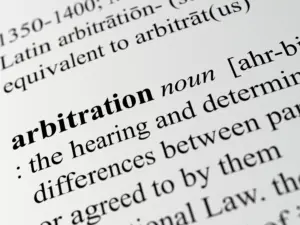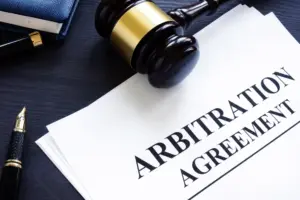When conflicts arise, individuals and entities will try to find ways to have it resolved outside of the courtroom by looking into alternative dispute resolution methods, such as mediation and arbitration. While both of these involve a neutral third party, they are vastly different in terms of structure, formality, and outcome. Understanding how these vary from one another will help affected parties choose which approach would be the best to pursue with their particular situation and whether it will help them achieve their goals.
What Is Mediation?

Mediation is a voluntary, informal negotiation process facilitated by a neutral third party called a mediator. The mediator does not decide the outcome, but they help both sides communicate more effectively, identify key issues, try to explore solutions, and work toward a mutually acceptable settlement. These sessions are typically non-binding collaborative efforts used to preserve relationships between parties during a legal dispute. For example, in employment disputes, family law matters, or business partnerships.
What is Arbitration?
Arbitration is a more formal process in which a neutral arbitrator (or a panel of arbitrators) hears evidence, listens to arguments, and makes a final decision. Unlike mediation, arbitration closely resembles a private trial, where the final decision is binding, meaning whatever the arbitrator decides, that will be the outcome. Arbitrations are frequently used in employment disputes, consumer contracts, insurance and business disputes, and even personal injury claims involving contractual clauses.
What Happens if You Lose in Arbitration?
If you lose in arbitration, the other party will ask the court to enforce the award, which will include confirming it as a court judgement that requires you to pay or take other actions. Most arbitration awards are final and binding. This means that they will carry similar weight as a court case outcome. But, you will have a limited chance to appeal the arbitrator’s decision in court, though the grounds for doing this are rarely successful. If the arbitration process was non-binding, you could still be given the option to reject the decision and proceed to civil litigation.
What Comes First, Mediation or Arbitration?
In most legal disputes, mediation will come first. This allows the disputing parties to attempt a collaborative settlement prior to participating in a more formal process of arbitration. If both parties agree to a solution during mediation, there will be no need for arbitration. With no cooperation, the dispute could lead to the arbitration process, where an arbitrator’s decision or a court ruling will be the binding decision.
What Are the Pros and Cons of Mediation?
Mediation is a form of alternative dispute resolution where a neutral third party helps disputing parties work toward a mutually acceptable solution. The pros include:
- Faster resolution
- Lower costs
- Confidential
- Solve problems collaboratively
Since a trained mediator works to guide discussion, the process promotes cooperation from all parties involved. The cons are that it is typically non-binding, so if both sides cannot agree to a solution, the dispute will continue into arbitration or court proceedings. In addition, power imbalances may affect the outcome.
What Is the Difference Between Court and Arbitration?
While courts and arbitration handle legal disputes, there are notable differences. A court case is part of civil litigation, done publicly under strict guidelines, and is overseen by a judge. Parties may have rights to discovery, motions, and appeals. But, this can be slow and costly.
Arbitration is more of a private process where an arbitrator reviews evidence, listens to arguments from each side, and forms a binding decision. It is generally a faster approach and more confidential. Arbitrators are picked based on their level of expertise. The arbitration process is highly favored in commercial contracts because of arbitration clauses, which require disputes to be handled outside of court.
Are Mediation Agreements and Arbitration Awards Legally Binding?
Mediation and arbitration differ greatly in terms of legal enforceability. Mediation is generally a non-binding process, meaning that the mediator cannot push a decision on the parties. But, if they reach an agreement during the mediation and put it into writing, that settlement agreement can become a legally enforceable contract. This gives mediation outcomes legal weight once each side has approved and signed the decision, even though this process is voluntary and collaborative.
On the other hand, arbitration results in a binding final award. Once an arbitrator forms a decision, it will have the same effect as a court judgement. The losing party will be required to comply, and the winning side may ask a court to confirm the award and have it enforced, if necessary, making it a dispute conclusively resolved. While arbitration awards can be appealed in some cases, the grounds to do this are very limited, thus making them far more final than mediation outcomes.
Simply put, mediation agreements can be legally binding after formalization whereas arbitration awards are binding and enforceable, providing two different routes to a resolution depending on each parties goals and cooperativeness to compromise.
Which Side Typically Wins in Mediation vs Arbitration?
In mediation, both parties can be deemed as winners if they reach a mutually acceptable solution. Success will vary depending on willingness to compromise and whether the right mediator is managing the discussion. Who wins in an arbitration will differ based on the case. There is currently conflicting data on whether individuals or corporations reach a successful outcome.
A 2022 study by the U.S. Chamber of Commerce Institute for Legal Reform (ILR) discovered that consumers and employees tend to win more often and acquire higher awards in arbitration than in court. But, other organizations, like the Economic Policy Institute (EPI), share the opposite information, where consumers and employees will win less often and receive lower pay in arbitration than they would in court. These studies show that whether arbitration or court is better for consumers and employees is not necessarily clear. Results will depend on the case itself, the arbitrator, and how the matter is handled.
With that said, the arbitration process is typically quicker and less formal in comparison to litigation, which some parties may see as a benefit, particularly when they want to resolve the situation privately to avoid court delays.
How Do Costs and Time Compare Between Mediation and Arbitration?
Mediation will be the most cost-effective approach when compared to an alternative dispute resolution option. It does not involve lengthy civil litigation, minimizes attorney fees, court expenses, and time spent in court proceedings. Arbitration is more costly because of arbitrator fees and formal procedures, such as documentation, hearings, and potential expert testimony. Both of these options allow the parties involved to save time and money compared to litigation. But, mediation is known to be the least expensive route to take, particularly when a collaborative settlement is met early in the mediation process.
When Should You Choose Mediation Over Arbitration?
Mediation and arbitration are both a type of alternative dispute resolution. But, they serve different purposes when it comes to the circumstances surrounding the dispute and the parties involved. Mediation is beneficial for cases where both sides work with one another and look into solutions that are outside of a courtroom setting. It provides flexibility, maintains relationships, and allows each side to control the final decision. But, it is not necessarily the right choice for every occasion.
Mediation works best in disputes where all parties are acting in good faith and are determined to have the situation resolved on their own terms. It can be especially convenient in disputes involving business partners or family members, where maintaining a relationship is important and each party values privacy. Since mediation encourages open dialogue and compromise, it can lead to solutions that reflect the needs and priorities of all parties.
Mediation may not be the best approach to take in some cases. When one party holds financial, emotional, or psychological power, the other side may feel pressured into accepting an unfair result. While experienced mediators can try to address these imbalances, serious cases typically require a more formal process, like arbitration or litigation, that provides stronger procedural protection.
When it comes to cases involving domestic violence, psychological abuse, or coercion, mediation is usually not suggested. The presence of fear or intimidation will make it difficult to negotiate freely and voluntarily. And with instances where emotions are at a high or communication is practically non-existent, mediation will not be as effective. Arbitration or court proceedings may be a better option as either one of these can provide a more structured environment to seek resolution.
When Is Arbitration the Better Option?
Arbitration is considered the better option when the disputing parties want a quick, private, and legally binding resolution. Unlike mediation, where a neutral third party helps everyone reach a mutually acceptable solution, arbitration is a more formal process where an arbitrator will listen to each side and present a binding decision. Since an arbitrator can make a final decision, it offers certainty and closure for the disputing parties involved who are interested in resolving conflicts efficiently.
Can Courts Enforce Mediation or Arbitration Decisions?
Courts usually cannot enforce mediation decisions unless the agreement is formalized and signed by all parties involved. However, arbitration awards are legally enforceable. Courts may ensure compliance with the final decision if a party chooses not to follow it. This is one of the reasons why arbitration is preferred when certainty and resolution are essential.
What Are Common Misconceptions About Mediation and Arbitration?
A common misconception about mediation and arbitration is that mediation is a binding decision, when really, it is non-binding unless the parties turn their agreement into a contract. Another misunderstanding is that arbitration is as informal as mediation, when it is really a formal process that is regulated by structured rules and procedures. Some will also believe that courts favor arbitration or mediation outcomes, but in practice, results will vary based on the following:
- The evidence provided
- The form of legal strategy used
- The skills of a trained mediator or arbitrator
Knowing these distinctions are important when deciding what would be the most effective conflict resolution method.
How Confidential Are Mediation and Arbitration Proceedings?
Both mediation and arbitration are typically private. Unlike a court case, mediation discussions will be confidential, allowing the parties involved to have a sense of comfort as they communicate openly without worrying about public exposure. Arbitration proceedings may also be private. But, confidentiality will not be automatic. It will be dependent on the parties’ agreement or institutional rules. Since both of these methods keep matters out of the public courtroom and provide a greater degree of privacy, they are favored for sensitive legal disputes.
Do Lawyers Prefer Arbitration or Court?
Lawyers may prefer either arbitration or court depending on the case they are working on and the client’s needs. Arbitration tends to go by faster, is more private, and gives parties the opportunity to choose the right arbitrator whereas the court will give opportunities to set legal precedents and will include expanded appeal options. Many lawyers and businesses will sway towards arbitration since it is more cost-effective, quicker, and allows parties to have control over the process along with who gets the final say in what the outcome will be.
Involved in a Legal Dispute? West Coast Trial Lawyers Is Here to Help
If you are in a legal dispute, working with a skilled attorney can help you determine if you should move forward with mediation or arbitration. At West Coast Trial Lawyers, our personal injury attorneys can assist when it comes to reviewing arbitration clauses or preparing for the mediation process. We can also review any proposed binding decision before it is made final.
Whether you prioritize a mutually acceptable solution through cooperation with the opposing side or want to resolve legal matters conclusively through arbitration, we will protect your interests and navigate you to the most ideal form of conflict resolution.
To set up a FREE consultation, you can reach out to us by calling (213) 927-3700 or filling out our convenient online contact form.





















































































